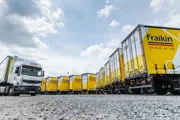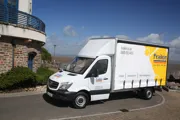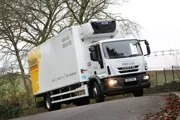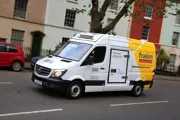Fraikin Group is the largest commercial vehicle fleet services company in Europe, but despite the UK being the French-headquartered organisation’s first international step almost 40 years ago it has become, by its own admission ‘forgotten a bit’ among the promotional activities of more brash newcomers.
That’s set to change: Fraikin is gunning for growth across the UK light and heavy commercial vehicle markets under the leadership of operations director Mark Newnes and sales director Colin Melvin (a managing director is currently being recruited following the recent departure of Hugh Cole for personal reasons).
Newnes, who joined the business in 2004, points to a reputation for customer service excellence and client longevity, but admits to Fraikin being “modest” in terms of trumpeting success and “pushing the brand” and suggests “the name is well known, but has also been forgotten a bit”.
The £70 million turnover UK business is split into three core areas: a funded contract hire fleet of 3,600 vehicles, 4,500 vehicles under fleet management and a short-term rental fleet of 1,220 units.
Fraikin entered the UK trailer rental market this year with a 200-strong fleet of single- and double-deck curtainside units for hire. The newly refurbished and rebranded fleet emerged out of the wreckage of parcels carrier City Link, which collapsed over Christmas last year. Fraikin previously supplied the trailers on contract hire to the firm.
The trailers were returned following City Link’s collapse, but a new business was created to fill a missing hole in Fraikin’s fleet offering. The company is confident about its growth potential.
Under a “one-stop shop” strapline, Newnes is targeting “healthy, double-digit, organic growth across our portfolio” with the sales push focused on three target areas:
■ The construction/building sector (in light of UK economic growth).
■ The general transportation market (on the back of the rapid rise in online shopping).
■ The retail and food sector, including refrigerated vehicles.
Fraikin forecasts fleet growth across LCV and HGV sectors but, mirroring new vehicle registration figures, believes the greatest volume will be in the van sector. Society of Motor Manufacturers and Traders’ figures show commercial vehicle registrations were up 17% last year compared to 2014, with van volumes up 15.6% (up 50,144 units) and trucks up 25% (10,595 units).
Fraikin has also invested in bolstering its sales force, including recruiting public sector specialists.
The public sector accounts for 15% of Fraikin’s business, but Melvin says: “Public sector will be a big focus for us in 2016. We understand that austerity is driving efficiencies and through our consultancy service we can help fleets reduce cost and also add value.”
While Fraikin points to a low attrition rate among its customers, which include Sainsbury’s and the National Blood Service, the company says many use more than one commercial vehicle supplier.
Newnes, who spent nine years before joining Fraikin at Healthcare Logistics – now Movianto UK – where he was general manager, responsible for eight depots, 350 staff and 150 trucks, says: “We are asking lots of questions and looking to penetrate deeper into customers’ fleet operations.”
He believes customers want assistance to:
■ Reduce their total fleet operating costs.
■ Ensure compliance with burgeoning regulations.
■ Minimise their environmental impact.
This is where Fraikin’s consultation service comes into its own, says Melvin: “It is a process of moving away from the commoditisation of looking at one element of cost. We take customers through the whole life cost cycle, including vehicle accidents and downtime, mapping where they are today and overlaying that with compliance issues where they have risk exposure. It is a very consultative approach.
“By helping customers understand the total cost of ownership of fleet vehicles and the cost of compliance, we can demonstrate how they can operate at low cost.”
It is frequently highlighted that LCV fleets are not run as diligently as operations over 3.5 tonnes, due to the sector being unregulated. However, Fraikin detects a move away from “lumping management of van fleets in with car fleets”, particularly among larger corporates.
Melvin says: “We are able to help fleets understand why LCVs should be managed in the same way as HGVs, assist in that transition and demonstrate improved cost effectiveness.”
Keeping vehicle off-road time to an absolute minimum is critical for commercial fleets and Fraikin is investing in mobile engineers and strategically placed shipping containers packed with tools and equipment to undertake vehicle inspections and servicing at customers’ premises and other key locations.
Newnes, who is responsible for service delivery through a team of customer managers, says: “Fleets don’t want to incur vehicle off-road time, so compliance can suffer. However, our mobile team of engineers delivers flexibility so work can be scheduled to ensure minimum interruption.”
The current team of 30 mobile engineers is due to expand to between 50 and 60 next year, while the network of containers will also grow.
The shipping container approach gives Fraikin flexibility and means the business is not investing in or signing long leases on property that could prove to be a financial liability.
Fraikin places a lot of faith in its customer service and has invested in Net Promoter Score (NPS), a mechanism to drive profitable growth through exceptional customer experience. Over the past two years, Fraikin’s NPS has increased significantly. ‘Professional’, ‘reliable’, ‘convenient’ and ‘efficient’ were the four words most frequently mentioned by clients.
Fraikin now has an NPS of 26, which, places it ahead of internet service providers (an industry average NPS of -3), but behind department and specialty stores, which lead the way (58).
Newnes says: “Fraikin has a very high service ethos and many devoted employees. People who have been in the industry know the name, but we want to appeal to a larger sector of industry.”
Private equity firm CVC Capital Partners owns the £584m turnover Fraikin Group, which has operations in 16 countries, about 7,000 clients and a fleet of more than 64,000 vehicles.
It gives the company scale and capacity, says Newnes: “Fraikin is big enough to procure like a supermarket, but flexible and nimble enough to behave like a corner shop.”
The company also operates a ‘Fraikin Lab’ in France, where a large technical team works closely with vehicle manufacturers’ research and development departments gaining valuable insight into cutting-edge future developments, notably in alternative fuel developments.
“We have a lot of knowledge and industry insight at our disposal and we need to use that more to help our customers plan for the future,” says Newnes.
Fraikin says it differentiates itself from its competitors through service excellence and the use of technology.
“We are a data-driven business,” says Melvin, highlighting the company’s web-based portal Fraikinview, being rolled out to customers this year, which delivers real-time information on all aspects of fleet operations.
“We are using technology to drive efficiencies and add value. Technology is one thing that will differentiate us from the competition,” he adds.
Fraikin has a Europe-wide partnership with telematics specialist Masternaut and is keen to deliver the technology to more commercial vehicle fleets.
“Fleets are under extreme pressure to reduce costs,” says Melvin. “Utilising real-time data drives efficiencies.”
This year, Fraikin has invested about £15m in 300 new rental vehicles – the largest annual investment in its hire fleet for a decade – as it tries to cut average vehicle age to two/three years from the previous five/six years. It may spend as much as £7m a year over the coming years.
The company discussed the make-up of the hire fleet with customers – this year’s orders were split between Iveco and Mercedes-Benz, comprising a mix of 3.5-, 7.5-, 12-, 18- and 26-tonne vehicles, including vans, refrigerated vans, refrigerated boxes, boxes, curtainsiders, Lutons and dropsides – because, says Newnes: “We want to keep it fresh and ensure the right vehicles are available at the right place”.
Factfile
Contract hire fleet size: LCVs – 1,200; trucks and trailers – 2,400
Vehicles under fleet: management LCVs – 4,000; trucks and trailers – 500
Rental fleet: LCVs – 220; trucks and trailers – 1,000
























Login to comment
Comments
No comments have been made yet.